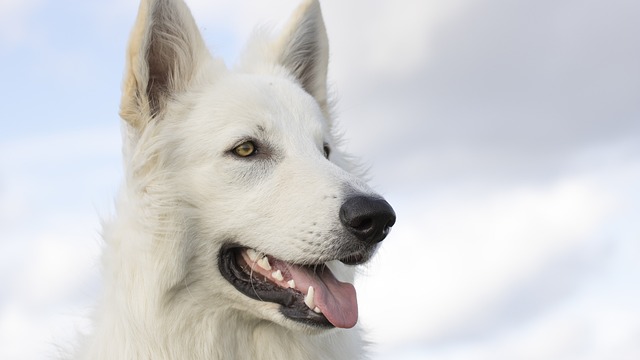Dogs are the most loyal companions in our lives. Every move they make constantly tugs at our heartstrings. When dogs have an upset stomach, they can't tell us in words, but can only convey their physical discomfort through their behaviors. As owners, understanding the behavioral characteristics of dogs when their stomachs are upset is crucial for promptly detecting problems and taking appropriate measures.
There are various reasons for dogs to have an upset stomach. In terms of diet, ingesting foreign objects is one of the common factors. Dogs are naturally curious and full of a sense of exploration about everything around them. Sometimes, they accidentally swallow things they shouldn't, such as toy fragments, socks, plastic bags, etc. Once these foreign objects enter the gastrointestinal tract, they may block the intestines and trigger stomach discomfort. In addition, irregular eating habits, such as suddenly changing the brand of dog food, overfeeding or underfeeding, or giving dogs human food, especially greasy, spicy, and irritating foods, can all lead to disorders of the dog's gastrointestinal function. Some food allergies or intolerances can also make a dog's stomach "act up". For example, some dogs are lactose intolerant and prone to gastrointestinal discomfort after drinking milk.
Healthy dogs are usually full of energy and interested in the things around them. However, when an upset stomach strikes, the dog's mental state will change significantly. They may become listless, lying lazily in the corner all day, losing enthusiasm for daily activities such as playing and walking. Their eyes will also become dull, no longer as bright as usual. This mental sluggishness is a distress signal from the dog's body, indicating that it is suffering from the pain brought about by an upset stomach.
The change in appetite is also a significant manifestation of a dog's upset stomach. Under normal circumstances, dogs are always enthusiastic about food and will excitedly gather around their owners at mealtime. But when their stomachs are uncomfortable, they may experience a loss of appetite and show no interest in the food they usually like, not even smelling it. Some dogs may just eat less than usual, while severe stomach discomfort may cause the dog to completely refuse to eat. This decrease in appetite is because the upset stomach makes the dog feel nauseous and uncomfortable, and eating will further irritate the stomach and aggravate the discomfort.
 When a dog has an upset stomach, the digestive system will be affected, resulting in abnormal bowel movements. Diarrhea is one of the more common symptoms. The dog's feces will become soft and may even be watery, and the color may also be different from normal, sometimes being blackish or greenish. This is because the intestinal peristalsis speeds up, and the intestine's ability to absorb water decreases, increasing the water content in the feces. In addition, constipation may also occur. The dog will show difficulty in defecation, straining hard but having trouble passing stools, or the frequency of defecation will be significantly reduced. Constipation may be due to a foreign object blocking the intestine or a slowdown in intestinal peristalsis caused by a disorder of the gastrointestinal function. Whether it is diarrhea or constipation, it will make the dog feel physically uncomfortable and affect its normal life.
When a dog has an upset stomach, the digestive system will be affected, resulting in abnormal bowel movements. Diarrhea is one of the more common symptoms. The dog's feces will become soft and may even be watery, and the color may also be different from normal, sometimes being blackish or greenish. This is because the intestinal peristalsis speeds up, and the intestine's ability to absorb water decreases, increasing the water content in the feces. In addition, constipation may also occur. The dog will show difficulty in defecation, straining hard but having trouble passing stools, or the frequency of defecation will be significantly reduced. Constipation may be due to a foreign object blocking the intestine or a slowdown in intestinal peristalsis caused by a disorder of the gastrointestinal function. Whether it is diarrhea or constipation, it will make the dog feel physically uncomfortable and affect its normal life.
In addition to abnormal bowel movements, dogs with an upset stomach may also experience vomiting. The frequency of vomiting and the characteristics of the vomit can provide important clues for us to judge the dog's condition. Sometimes, the dog may only vomit once occasionally, and the vomit is undigested food, which may be caused by eating too fast or eating indigestible food. But if the dog vomits frequently, and the vomit contains yellow or green liquid, or even blood, it means the situation is more serious. There may be gastrointestinal inflammation, ulcers, or other serious diseases. When the dog vomits, its body will contract violently, and its expression is painful. As owners, seeing this often makes us feel extremely distressed.
Some dogs may also show behaviors of abdominal discomfort when their stomachs are upset. They may frequently lick their abdomens, trying to relieve the pain or discomfort in the abdomen. When we touch the dog's abdomen, it may show resistance and even make a whining sound, indicating that its abdomen is very sensitive, and a gentle touch can cause pain. Some other dogs will curl up into a ball to reduce the pressure on the abdomen and make themselves feel a little more comfortable.
When we notice that a dog shows the above behaviors of an upset stomach, our hearts are often filled with worry and anxiety. We feel sorry for the pain the dog is suffering and are also concerned about its health. At this time, we need to stay calm, carefully observe the dog's symptoms, and take corresponding measures in a timely manner. If the dog's symptoms are mild, such as occasional vomiting or mild diarrhea, we can first stop feeding for a few hours to let the dog's stomach rest, and then provide it with a small amount of warm water to prevent dehydration. After that, gradually resume feeding some easily digestible foods, such as rice porridge and chicken puree.
However, if the dog's symptoms do not improve, or if it shows severe vomiting, diarrhea, bloody stools, or extreme lethargy, it is essential to take it to see a veterinarian as soon as possible. Veterinarians can accurately determine the cause of the dog's upset stomach through professional examinations, such as blood tests, fecal examinations, and X - rays, and provide targeted treatment.
During the recovery period of a dog with an upset stomach, we need to give it more love and care. Accompany it more, gently stroke it, and let it feel our care and support. Feed the dog medicine on time to ensure it takes in enough water and nutrition. At the same time, pay attention to adjusting the dog's diet, following the principle of small and frequent meals, and avoid feeding it foods that may cause stomach discomfort again. Watching the dog gradually regain its former vitality and become lively and lovely again, our hearts will also be filled with joy and relief.
Dogs are an indispensable part of our family, and their health and happiness are our greatest concerns. By paying attention to the dog's behavioral changes, promptly detecting the symptoms of an upset stomach, and providing appropriate care and treatment, we can help the dog relieve pain and recover health. Let us accompany the dog through every healthy and happy day with love and patience, and create more beautiful memories together.

 When a dog has an upset stomach, the digestive system will be affected, resulting in abnormal bowel movements. Diarrhea is one of the more common symptoms. The dog's feces will become soft and may even be watery, and the color may also be different from normal, sometimes being blackish or greenish. This is because the intestinal peristalsis speeds up, and the intestine's ability to absorb water decreases, increasing the water content in the feces. In addition, constipation may also occur. The dog will show difficulty in defecation, straining hard but having trouble passing stools, or the frequency of defecation will be significantly reduced. Constipation may be due to a foreign object blocking the intestine or a slowdown in intestinal peristalsis caused by a disorder of the gastrointestinal function. Whether it is diarrhea or constipation, it will make the dog feel physically uncomfortable and affect its normal life.
When a dog has an upset stomach, the digestive system will be affected, resulting in abnormal bowel movements. Diarrhea is one of the more common symptoms. The dog's feces will become soft and may even be watery, and the color may also be different from normal, sometimes being blackish or greenish. This is because the intestinal peristalsis speeds up, and the intestine's ability to absorb water decreases, increasing the water content in the feces. In addition, constipation may also occur. The dog will show difficulty in defecation, straining hard but having trouble passing stools, or the frequency of defecation will be significantly reduced. Constipation may be due to a foreign object blocking the intestine or a slowdown in intestinal peristalsis caused by a disorder of the gastrointestinal function. Whether it is diarrhea or constipation, it will make the dog feel physically uncomfortable and affect its normal life.



